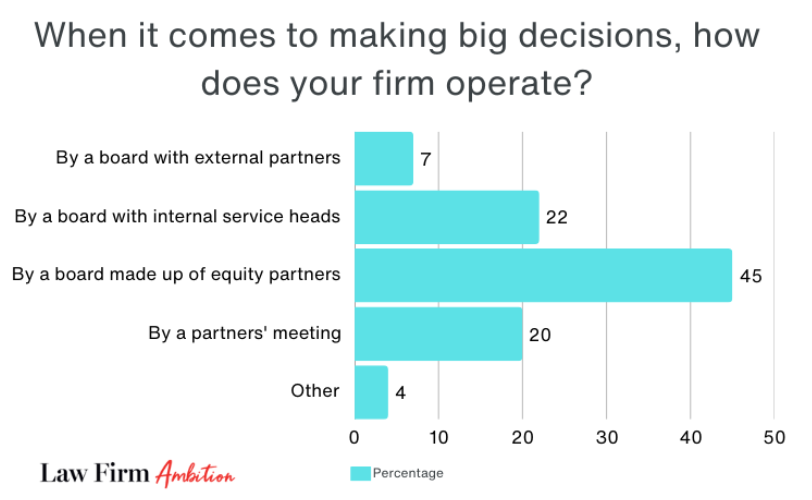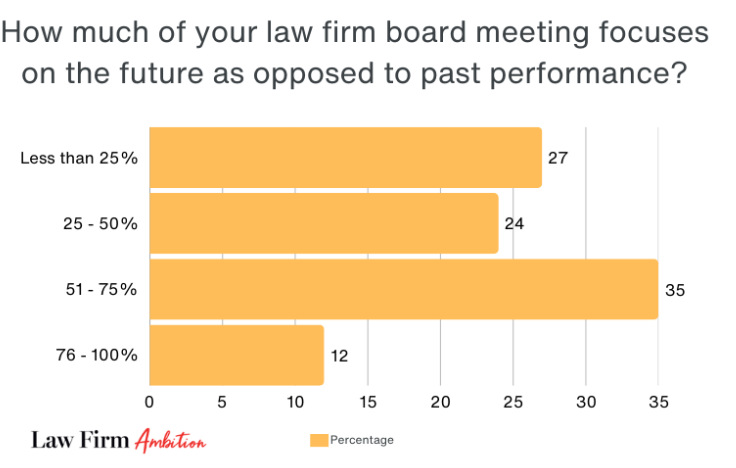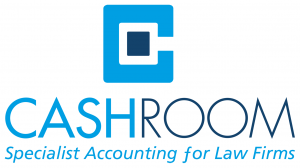An Effective Board for Your Law Firm
This article is inspired by the recent webinar “An Effective Board for your Law Firm” from Law Firm Ambition.
An effective board can completely transform your legal practice. The world is constantly shifting, and running a law firm today can feel like navigating through a storm -unpredictable, with shifting winds and ever-changing conditions. In such an environment, it’s essential to stay steady and adapt quickly to maintain control.
The role of a board is crucial in navigating the complexities of modern business. For law firms, a board serves as the steering wheel, ensuring the firm is heading in the right direction in a dynamic and often uncertain market. The role of executives and board members must be clearly defined to avoid confusion and overlap. The board provides strategic direction, while the executives maintain operational integrity, focusing on finance and day-to-day operations.
Poll Results: How is Your Law Firm Run? 
These results highlight a clear shift: only 20% of firms are still making decisions entirely within a partners’ meeting, and an increasing number are incorporating external voices in their decision-making processes. It’s an indication that law firms are recognising the value of having diverse viewpoints at the decision-making table.
What Does a Good Board Look Like?
An effective board should have a mix of internal and external members, including department heads and key representatives from major practice areas. Often, traditional law firms fall short in this regard, relying heavily on a small group of equity partners or department leaders without enough input from other stakeholders.
A diverse board that includes operations lawyers, business strategists, and financial experts ensures balanced decision-making. After all, running a law firm is just as much about business acumen as it is about legal expertise. Boards should not confuse business ownership with business capabilities. Everyone on the board must understand their role within the business context, ensuring that strategic decisions are made with an eye on the firm’s overall success, not just the success of one practice area.
The Importance of Regular and Well-Structured Agendas
A successful board meeting requires careful planning. Regular discussions on pre-decided topics allow the board to focus on strategic issues without getting bogged down by day-to-day operations. It’s important to create a structured meeting calendar that gives enough time to address key issues, celebrate wins, and allow for open discussion.
Boards should be proactive, setting aside time to discuss future strategies. A well-balanced meeting includes reflection on past performance but is not dominated by it. A strong agenda also avoids negative-only discussions. Celebrating successes creates an environment of positive energy, which is critical for championing a high-performing team.
Poll Results: How Much Time Does Your Board Spend Discussing the Future? 
This shows that while most boards spend a significant portion of time discussing the past, many law firms recognise the need to dedicate more attention to future planning. Effective boards need to focus on long-term growth while managing current challenges.
Formulating Strategy for the Future
Lawyers often pride themselves based on intellectual expertise, but strategic thinking is a skill that some legal professionals can find challenging. Strategy is about more than just focusing on current issues—it involves thinking ahead. Having business experts on the board, such as market researchers or data analysts, can provide valuable insights to craft a powerful and actionable business strategy.
By incorporating these insights, law firms can develop strategies that are both realistic and forward-thinking, ensuring they stay ahead of the competition. Having the right people in the right positions is key to navigating future challenges.
Dynamics Between Board and Partners
The relationship between board members and partners is vital to the success of any law firm. While board members make key decisions, they should always consult with partners to ensure that decisions align with the firm’s values and goals. Open, logical communication is critical, as it promotes understanding and cooperation.
Sending out information before board meetings gives everyone a chance to come prepared. This approach ensures more productive meetings and minimises surprises. When everyone is on the same page, it’s easier to make informed, strategic decisions.
The EOS System: A Powerful Framework
The Entrepreneurial Operating System (EOS) is an excellent tool for law firms looking to streamline their management process. EOS helps create a common language and framework within the firm, promoting clarity and alignment across the organisation. It establishes clear goals (“rocks”) and helps track progress toward achieving them.
By using EOS, law firms can gain traction in both their strategic initiatives and daily operations, ensuring they stay focused on growth and improvement.
How to Evaluate Your Board’s Effectiveness
Evaluating the performance of a board is crucial to identifying areas of improvement. The two fundamental questions for evaluation are:
- Does the organisation meet its obligations to stakeholders?
- Is the organisation effective and efficient in achieving its purpose?
Surprisingly, 71% of boards in a U.S. poll rated their boards as either “poor” or “average.” These alarming statistics suggest that many boards could be doing more to serve their firms effectively.
Causes of a Dysfunctional Board
What leads to poor board performance? Often, it’s the VEG factors:
Vanity: A focus on personal interests rather than the firm’s best interests.
Ego: The need for power or control undermines collaboration.
Greed: Self-serving behaviour at the expense of the firm’s success.
A board member must possess capability, confidence, and a collaborative mindset. Dysfunction often arises from misalignment between board members, so it’s essential to encourage self-awareness and healthy communication practices.
What Makes a Good Chairman?
The chairman of the board plays a pivotal role in steering discussions and resolving potential conflicts. A good chairman possesses:
- Excellent judgment and commercial acumen
- Active listening skills
- An open-minded approach
- A keen sense of potential conflicts and a proactive approach to resolving them
Managing conflict is an inevitable part of any board’s dynamics, but with the right tools, it can lead to stronger outcomes rather than disrupt the team’s performance.
The Role of External People on Your Board
Incorporating external individuals on your board can bring fresh perspectives and new ideas. A 50/50 mix of internal and external members often proves to be the most effective. While legal sector experience can be beneficial, it is not essential. What matters most is the diversity of thought and expertise—business leaders, financial experts, and marketing strategists can offer valuable insights for growth.
The Next Generation of Law Firm Boards
In recent times, a growing number of firms are increasingly seeking the input of younger, tech-savvy professionals. These “next-gen” advisors can provide invaluable insights into emerging trends and help shape the future of the firm. Incorporating younger voices helps to future-proof the firm and align its strategy with changing market conditions.
Preparing Future Board Members
Developing the next generation of board members starts with a skills assessment. Firms should focus on leadership capabilities, mentorship programs, and even provide opportunities for up-and-coming leaders to sit on voluntary boards. This will ensure they gain experience and are prepared to step into strategic roles in the future.
While some law firms continue to make all their decisions exclusively through partner meetings, more are realising the value of diversifying their boards. An effective board, composed of a blend of internal stakeholders, external experts, and younger voices, can help your firm navigate the complexities of a rapidly changing legal landscape.
Incorporating diverse skills, strategies, and perspectives will not only help your law firm stay competitive but also prepare it for the future – securing long-term success for both the firm and its clients.
Special thanks to Law Firm Ambition hosted by Andy Poole, with speakers Carl Newton, Alexandra Hatchman and Patrick Dunne for another informative session.
Be sure to sign up to our newsletter and follow us on LinkedIn for information about Law Firm Ambition’s next webinar and how to register.
Get in touch to arrange a confidential chat with a member of our team.
P: 01695 550950
About Cashroom
Cashroom provides expert outsourced accounting services for Law Firms including Legal Cashiering, Management Accounts and Payroll services. Our mission is to free lawyers from the complexities of legal accounting by supporting the industry with accurate management information and allowing lawyers to do what they do best – practice law.
provides expert outsourced accounting services for Law Firms including Legal Cashiering, Management Accounts and Payroll services. Our mission is to free lawyers from the complexities of legal accounting by supporting the industry with accurate management information and allowing lawyers to do what they do best – practice law.
‘The Cashroom have been an integral part of MBM from their inception. They has supported the growth of MBM from a small firm of 15 people all the way to the 70+ partners and staff now working in the firm. I have first hand experience of the wealth of skill employed within the business and the cashiering knowledge is unrivalled. The fluid ability of Cashroom to adapt to the changing requirements of a firm on a daily basis, as well as the ability to cover holiday periods seamlessly would be a benefit to any law firm. The Cashroom portal provides a first class workflow system for all cashiering requests and, more importantly, provides the level of security that email instructions do not. Cashroom provide both a cost effective fully outsourced service that can deliver almost everything that an internal finance team would be charged with, as well as a wraparound service to support an internal finance team.’

